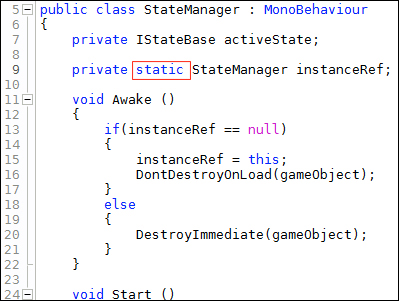In the code block of the Awake() method, we're going to check if the GameManager GameObject already exists. If it doesn't, we'll save it to a variable and tell Unity not to destroy it when any other Scene level is loaded. If it does already exist, we'll tell Unity to destroy any new GameManager GameObjects created.
Insert the new code as shown in the following steps:
- Add a new
staticvariable on line 9. - Add the
Awake()method at lines 11 through 22 as shown in the following screenshot:
An analysis of the code shown in the preceding screenshot is as follows:On the StateManager class
Line 9: private static StateManager instanceRef;
- This variable named
instanceRefstores aStateManagertype which is a reference to theStateManagerobject in the memory - This is also a
staticvariable - This means, that in this example, each instance of the
StateManagerComponent object that's created will share and see the same value - It is
privateso it can't be changed from outside theStateManagerclass
Line 11: void Awake()
Line 13: if(instanceRef == null)
- This
ifstatement is checking whether theinstanceRefalready stores a reference to aStateManagerComponent object in the memory - If the value is equal to
null, meaning no reference is stored, theifcode block is executed - If the value is not
null, meaning there is already a reference to aStateManagerComponent in the memory, theelsecode block is executed
Line 15: instanceRef = this;
- Since there's no
StateManagerComponent reference stored,this, which stores a reference to thisStateManager, is assigned toinstanceRef - This will be the case when the game has just started and the
StateManagerComponent is created for the first time
Line 16: DontDestroyOnLoad(gameObject);
- This method tells Unity to not destroy the GameManager GameObject, which the
StateManagerComponent is attached to when changing to another Scene level
Line 20: DestroyImmediate(gameObject);
- When BeginningScene is reloaded, another GameManager GameObject is created
- Since
instanceRefis not null, this second instance needs to be destroyed so that only the original GameManager exists - The
DestroyImmediate(gameObject)method destroys the second copy that was just created
..................Content has been hidden....................
You can't read the all page of ebook, please click here login for view all page.
